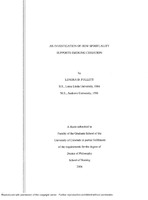An investigation of how spirituality supports smoking cessation
View File(s)
- Author(s)
- Details
-
Dr. Lenora D. Follett, PhD, RN
- Sigma Affiliation
- Iota Phi at-Large
Visitor Statistics
Visits vs Downloads
Visitors - World Map
Top Visiting Countries
| Country | Visits |
|---|
Top Visiting Cities
| City | Visits |
|---|
Visits (last 6 months)
Downloads (last 6 months)
Popular Works for Follett, Lenora D. by View
| Title | Page Views |
|---|
Popular Works for Follett, Lenora D. by Download
| Title | Downloads |
|---|
View Citations
Citations
Smoking is a worldwide problem with major economic impact. Smoking cessation is difficult to attain, with the majority of smokers desiring to quit smoking. Religiosity has consistently shown some association with decreased smoking levels and increased smoking cessation, but little was known about how spiritual practice or religiosity could be incorporated into smoking cessation interventions. The purpose of this study was to describe the aspects of spirituality that were reported to be helpful by those who said that God or their spirituality supported them in smoking cessation, and to describe other factors that combine with spirituality to accomplish success in smoking cessation. This study followed an exploratory design, using a qualitative descriptive methodology. Data were generated through taped interviews using open ended questions, focusing on how spirituality and factors other than spirituality contributed to success in smoking cessation. The sample consisted of 19 participants (11 women and 8 men) who had stopped smoking for at least a year. Thirteen of the participants were Seventh-day Adventists at the time of the study. Data were coded using Ethnograph 5.0. The codes were organized into categories and examined for patterns. Spirituality as "connection" was supported by this study, including the domains of Connection with Self, Connection with God, Connection with Others, and Connection with a Church. Connection with God was the most salient domain. All participants expressed a decision or commitment to stop smoking. Half of the participants had little or no struggle in smoking cessation. God was believed to have provided power above human power. Personal prayer was prominent in connection with God. Connection with others in smoking cessation and medication were most helpful to the three in live-in smoking cessation programs. Connection with a church was increased after smoking cessation. The other factors (besides spirituality) that contributed to success were considered less important and were not unique to this study, including exercise, drinking increased amounts of water, dietary changes and dealing with triggers.
This dissertation has also been disseminated through the ProQuest Dissertations and Theses database. Dissertation/thesis number: 3219950; ProQuest document ID: 304936709. The author still retains copyright.
This item has not gone through this repository's peer-review process, but has been accepted by the indicated university or college in partial fulfillment of the requirements for the specified degree.
| Type | Dissertation |
| Acquisition | Proxy-submission |
| Review Type | None: Degree-based Submission |
| Format | Text-based Document |
| Evidence Level | Other |
| Research Approach | Qualitative Research |
| Keywords | Smoking Cessation Techniques; Spirituality and Smoking Cessation; Smokers and Religion |
| CINAHL Subject(s) | Smoking Cessation; Spirituality |
| Grantor | University of Colorado |
| Advisor | Smith, Marlaine |
| Level | PhD |
| Year | 2006 |
All rights reserved by the author(s) and/or publisher(s) listed in this item record unless relinquished in whole or part by a rights notation or a Creative Commons License present in this item record.
All permission requests should be directed accordingly and not to the Sigma Repository.
All submitting authors or publishers have affirmed that when using material in their work where they do not own copyright, they have obtained permission of the copyright holder prior to submission and the rights holder has been acknowledged as necessary.
Related items
Showing items related by title, author, creator and subjects.
-
Gender and smoking cessation treatment for hospitalized smokers
Caruthers, Donna D.; Fiore, Roberta M.; Bare, Susan E. (2013-10-22)Session presented on: Friday, July 26, 2013: Purpose: Examine gender differences among a sample of hospitalized smokers formerly enrolled in a smoking cessation RCT. Methods: The primary aim of this secondary analysis, ... -
E-cigarettes as a harm reduction strategy for cigarette smokers
Talley, Brenda; Allen, Deborah (2016-03-17)Session presented on Sunday, July 26, 2015: Cigarette smoking carries a high risk for many health problems. Indeed, tobacco cigarette smoking has been classified by the World Health Organization as a disease in itself. ... -
Caring for pregnant smokers: Nurses' views on cessation interventions
Spegman, Adele M.; Wary, Andrea A.; Laam, Leslie A. (2012-9-12)Purpose: Smoking during pregnancy is a significant yet modifiable risk that negatively affects maternal and fetal health during pregnancy. Practice standards recommend assessment of tobacco use at each prenatal visit, ... -
Utilizing the SmokefreeTXT text messaging service to aid smokers to stop smoking in a primary care setting
Young, Alexander L. (2017-10-02)According to the CDC, 17.8% of people in the United States are current smokers. 23.4% of Ohioans smoke cigarettes daily, which is significantly greater than the national average. In the clinical setting where the project ... -
Smoking cessation counseling training for WIC nurses
Myers, Melissa D. (2017-11-30)Smoking is the leading cause of preventable death. An estimated 40 million adults in the United States currently smoke cigarettes (Center for Disease Control and Prevention [CDC], 2012), furthermore, nearly seventy percent ...





